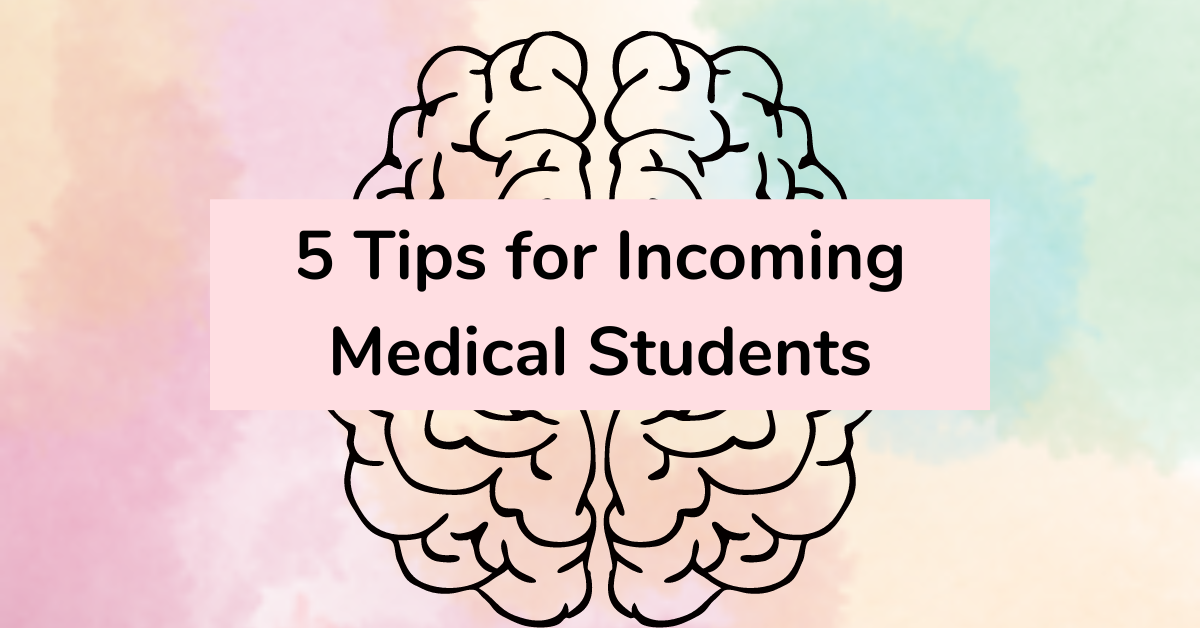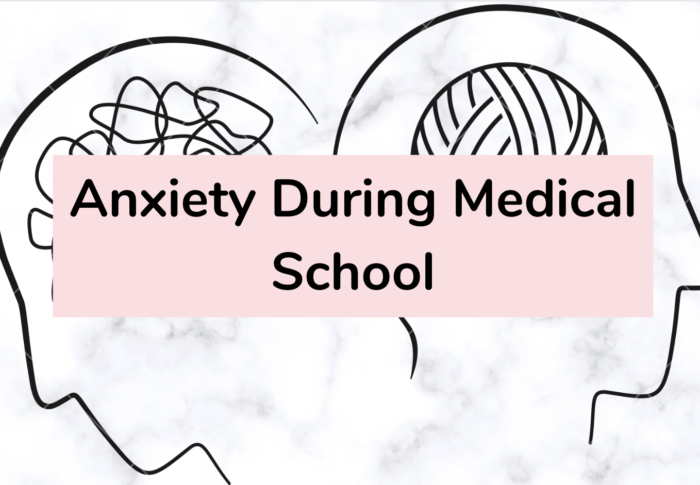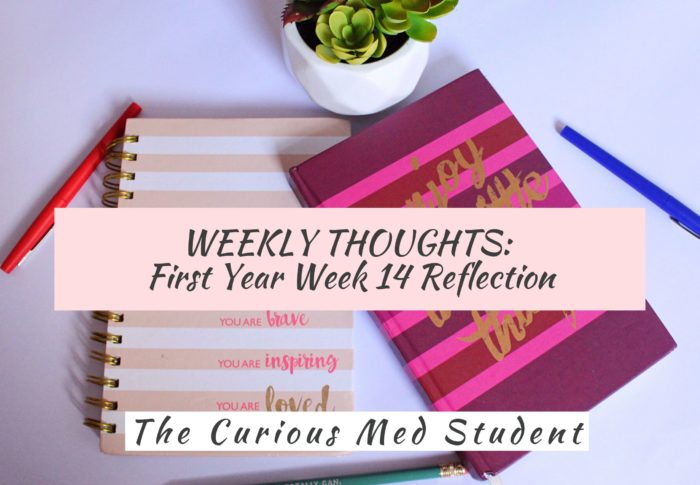
5 Tips for Incoming Medical Students
Medical school is full of mistakes. Whether one is willing to learn from them… that’s a different story.
Today, I wanted to share with you five lessons I learned. These are not novel lessons. In fact, I’m sure I’ve read these on other med student blogs and instagram accounts. However, these are my lessons that I think need to be repeated so other students can learn from them.
Plan Your Weeks
Each week of medical school could be slightly different. I found that the weeks when I didn’t schedule my time were the most stressful. Prior to medical school, I struggled with managing my time between studying and fun events.
At that time, I spoke to one of the learning experts at my school and he suggested I start scheduling my studying time based on how much time it would take me to complete the tasks and then schedule the fun events around that.
For medical school, I try to plan out the required events, the optional events, meetings, and my studying plan. I also try to fit in my exercise plans, grocery shopping, meal prepping and other errands.
When I plan all this out, I know what I should be doing and when I should be doing it. However, I’ve learned to be more lenient on myself about these schedules. I used to put a lot of pressure to get everything done and realized I spent more time worrying about getting it done.
These plans are outlines that I use as a guideline throughout the week and keeps me organized. If I don’t get to everything, that’s okay. The point is just to stay organized and aware of what needs to happen, and eventually I get to it.
Ask for Help
There is nothing wrong with asking for help. Whether it’s reaching out to block directors to help you understand difficult content or telling the course directors about some issues you’ve had with fulfilling requirements or mental health struggles, you should reach out to faculty.
The hardest part of asking for help is recognizing when to ask. I know that I wait too long sometimes to ask for content help. Through the year, I learned to write specific questions while studying so I can meet with faculty to go over them. It makes it easier for the faculty member to review the information if they know what you’re struggling with.
However, asking for help isn’t limited to just content. I asked for help multiple times through the year for emotional support. I had an incident with a classmate that hurt me deeply. I ended up speaking with my academic coach because it was difficult for me to process. He helped me rationalize the incident, and I wish I had seen him earlier to go over it.
Ultimately, it is up to you to recognize when you need help. It can be challenging to recognize when to reach out. You may feel insecure about it, but there is nothing wrong with asking for help. You are paying a lot of money for medical school, and asking for help means you are just using the resources that are available to you.
Take Breaks
Don’t fall victim to that “grind” mindset. I know, it’s hard. There’s this huge pressure for medical students to be constantly studying or at least studying every single day.
The saying “Medical school is a marathon, not a sprint” is very accurate. You need to take breaks to recharge and rest. The “grind” mindset leads to burnout and sacrificing mental and physical health. You will not be able to perform optimally on your exams or OSCEs. It will also seem very tempting at times especially if you compare yourself to your classmates, but it’s just not worth it.
By the end of my first year, I heard many of my classmates express how burned out they felt. Everyone was really tired, and just wanted the year to end. To my surprise, I didn’t feel that way. I was able to study optimally during my first two weeks of the block and then I felt super recharged at the end of the block.
When I reflected on my activities from those weeks, it was because I took actual breaks for once. For instance, I went home for my brother’s birthday which was conveniently right at the end of the LHK block. I refused to go back to school until there was a required activity on a Thursday and then I drove right back home so I could celebrate my birthday with my family the following weekend.
In the middle of the block, right when endocrine was half way done, I went home for my sister’s graduation. I did not study on that Thursday or the following Friday. It felt really good. When I finally studied on Saturday, the information stuck and everything started clicking into place again. The break was absolutely needed.
I no longer stress about studying every single day for most of the block because a few hours of high quality studying is much better than many hours of poor quality studying.
Find YOUR Resources
I know, I know. I have a whole post on resources that I used and wanted to share with you. I created that post so other students can look and see if they like them. They absolutely do not need to be used if they are not going to help you.
It is important for you to find what works for your studying needs. There are a lot of people selling different books, subscriptions, and products that all make claims that they will help you succeed in medical school. It’s essentially a lot of noise that you need to drown out so you can find what works for you.
Do NOT feel pressured to buy all the subscriptions and use all the same products as your classmates. Instead, talk to upperclassmen and see what resources they found helpful in studying. Their recommendations will be more specific to your school and how the material is taught and tested.
Figure out if you like textbooks or if you like reading lecture slides. See if you like Boards and Beyond or Youtube videos. Take your time and find a few resources. Then, use those resources well. If you feel like they are not helping, then branch out and try something new. The best part about the first year of medical school was that experimenting with different resources was possible.
Learn from Mistakes
Mistakes are the biggest part of learning. I felt like it was harder to learn from mistakes during undergraduate courses. The pressure to earn “perfect” grades for medical school applications made it very difficult for me to give myself the freedom to make mistakes.
However, at my medical school, there are many formative assignments and examinations. Formative meaning the grades on these assignments and examinations aren’t counted in our official grades. Having formative assignments has given me the freedom to make mistakes and learn from them. It was initially a blow to see my scores be lower than I was used to, but realizing that I can learn the material again to improve has been incredible.
In addition to the formative assessments, my school is in a pass/fail system which adds to the freedom of making mistakes.
Even if your school isn’t pass/fail or they don’t give formative marks, the mistakes you made are there to help you improve. You forgot to ask your patient about their medications during the medical interview? That’s okay, you’ll remember next time. You forgot which hormones are involved with satiety? That’s okay, you can review that material again before Step 1, and you’ll remember it better now.
It can be difficult to change to this mindset. My point is that you shouldn’t be too hard on yourself because you will improve.
Overall, these are my tips for incoming medical students. My main advice is to be kind to yourself. Medical school is difficult for everyone in different ways. You’ll get the hang of it eventually, and that’s all that matters. Let me know if you have any questions below. If you’re a medical student, what are your tips for incoming medical students?






